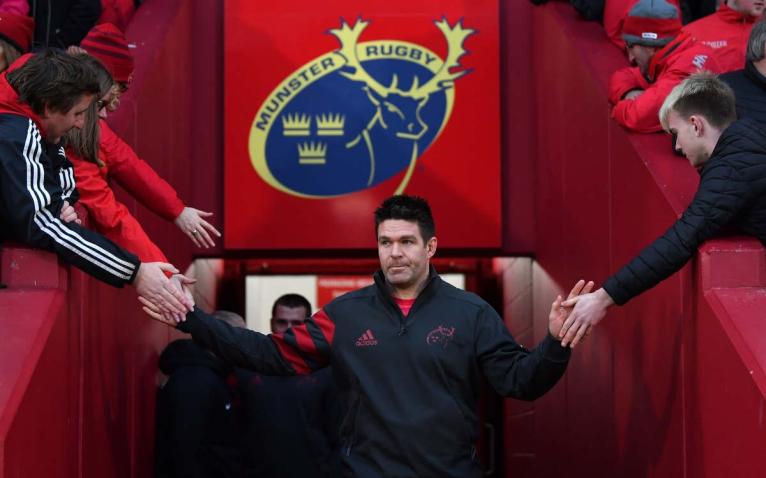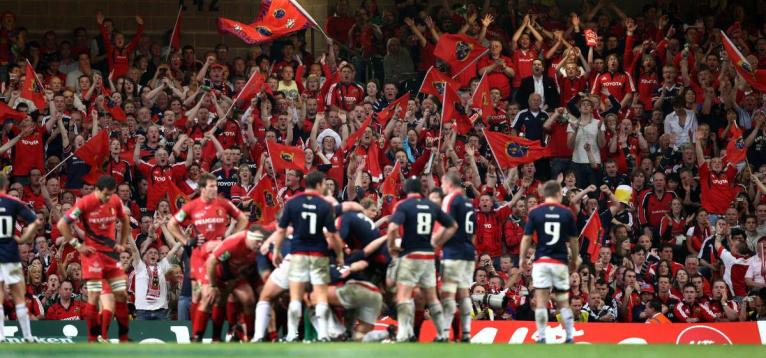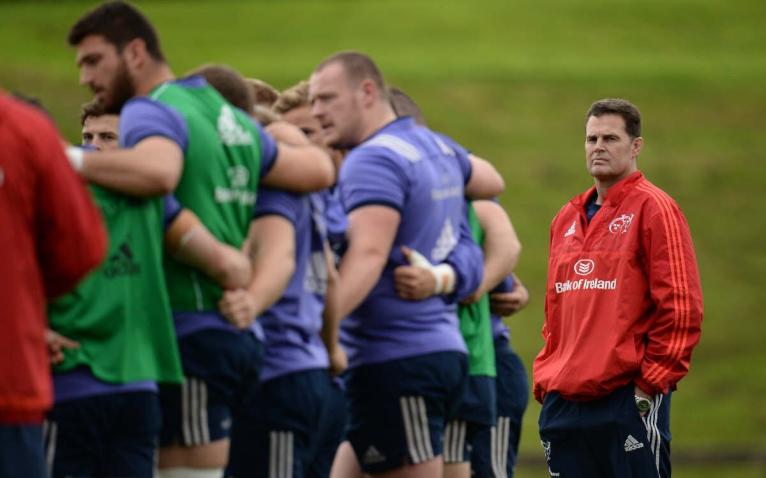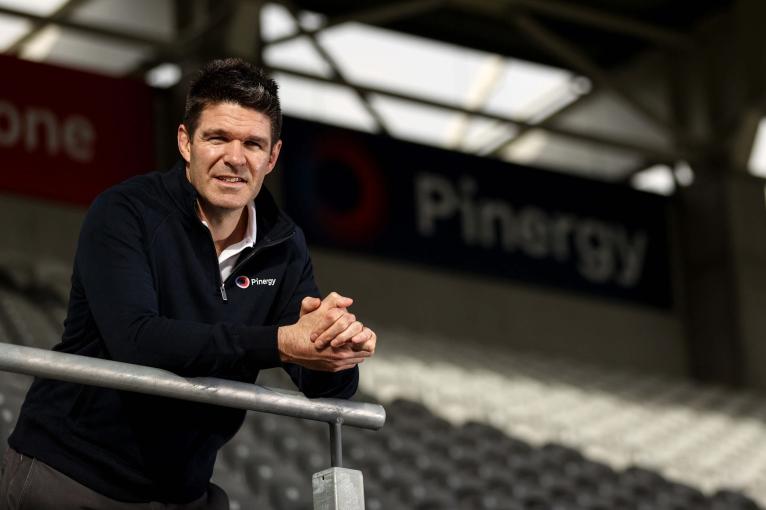Billy Holland has seen everything. He was there at the tail end of the Munster glory years and still around when a sporting boom turned to bust. He served under six of the ten coaches Munster have had in the professional era, suffering the trauma of having to bury one.
Anthony Foley’s passing hit hard not least because it was Foley who turned Holland’s career around, sitting him down one day in 2013 after the then 28-year-old had spent the previous half-hour tossing a coin to decide whether he was going to stay with his home-town club or accept a more lucrative offer from the Gallaher Premiership.
“I flipped the coin 50 times,” Holland recalls. “It was tails I stay, heads I go. Each time it came up heads, I tossed it again.”
Logic dictated he should leave. At Munster he was at the back of a queue headed by British and Irish Lions, Paul O’Connell and Donncha O’Callaghan. The club in England wasn’t just offering more money but more game-time. Holland was 28 and yet to find a rhythm or flow to his performances because he’d yet to get the opportunity to do so.
In this context, staying with Munster made no sense.
He stayed.
“Why’d I do it?” he asks rhetorically.
“It’s like this. Any time you played a European home game, a quarter-final say against a Toulouse, Toulon or Exeter, you knew on paper that they were better than you, more experienced, that their payroll was a hell of a lot higher.
“But in Thomond Park you know your family and friends are in the stands; you see their faces, hear their voices.
“And you know the following day when you are walking home, everyone will either congratulate you or look at you sideways, depending on the score. It is relentless. It is what makes playing for Munster both special and challenging. It’s so far from a job, it is non-stop.
“In other clubs it is just not like that. You can get lost in a big city in England or France. That doesn’t happen in Munster.”
For the first six years of his career it didn’t really happen for Holland either. He was bit-part player, but got a rare appearance the night of Thomond Park’s reopening when a Munster team missing 10 Ireland internationals took the All Blacks to the brink before Graham Henry looked at his bench and asked Kieran Read, Brad Thorn, John Afoa and Mils Muliaina to step off it.

Munster lost by two points but in doing so made a very significant point. This, essentially, was their B team. “It is a little perverse sometimes but I played those games with a fear we’d get pumped by thirty points,” says Holland.
“When that is your mindset, you are willing to do anything possible to win. Nothing is going to stop you.”
It’s why Munster’s game against the Springboks tomorrow doesn’t unnerve him. Again, logic dictates that the tourists, a side packed with internationals, will pummel Munster. But on the 247 times Billy Holland sat in those Munster dressing rooms and looked around at the faces sitting opposite, he was transported to another place.
When asked what those moments were like, he contorts his entire body to make a point, scrunching his face in different directions to show the pride, regret, grief and satisfaction he derived from spending 14 years of his life with one club.
“I got 100 caps for Munster by the age of 30; 150 over the next five years. It came the wrong way around but I’m glad it worked out that way because when you get there, you feel you have earned the right to wear the jersey. And you aren’t willing to let it go.”
To be in with a chance of beating a team like that [South Africa}. It’s not just about turning up. It is about going to a place that is so emotional and so deep in your soul.
He tells a story about a European night against Racing, when he and Dave Kilcoyne were scrummaging against Ben Tameifuna and Leone Nakarawa, outweighed by about 80kg in a pushing match they had no right to win.
They won.
“To be in with a chance of beating a team like that,” Holland says, “it’s not just about turning up. It is about going to a place that is so emotional and so deep in your soul. Those Munster boys who are there tomorrow, they will have to go to a place so deep inside themselves to have a chance of beating South Africa.”
As he discusses these things, it dawns on you how in a certain way Billy Holland, more than say Paul O’Connell or Ronan O’Gara, is the quintessential Munster Rugby man, given how his career was spent carrying the pressure of wearing that shirt, energised and exhausted by those spikes of adrenaline, those crushing defeats.
These highs and lows are common in all sport but in Munster they are taken to greater extremes as time after time you hear players speak about how they only ever get to rent the jersey rather than own it.
Holland rented it for 14 years and 247 games. That’s more than O’Gara managed, or O’Connell, or John ‘The Bull’ Hayes, Keith Earls, Conor Murray, Peter O’Mahony or Anthony Foley. In fact just one player, Donncha O’Callaghan, wore it more often.

Few outside Ireland know that. Few may even know Holland or his story.
Within Munster, though, he’s cherished, for his is an Irish kind of tale, make the most of yourself, fight for your dreams, don’t give up. Given the ruggedness of his play and unselfishness of his position on the second-row, it’s kind of unsurprising his career was spent under the radar, largely in off-Broadway settings in the PRO14.
In a way, the Munster story is a metaphor for what happened in the country, their peak years coinciding with the Celtic Tiger era, their decline kicking in after a second European Cup was won in 2008, when the Irish economy also dipped into recession.
As Munster battled to stay relevant against bigger-spending powers from overseas, Ireland too fought its way back economically. And in the middle of all this a second row forward called Billy Holland endured narrow failures in five Champions Cup semi-finals and so many other what-ifs and wasteland moments.
An emotional appearance on Ireland’s popular light entertainment programme, The Late Late Show, had a powerful impact on a national audience yet by this stage those within Munster Rugby’s tight-knit fan-base already knew the tragic story.
It meant that for so much of his career he wasn’t showered in praise but as time went on and his self-belief grew – ‘I badly lacked confidence early in my career’ – fans started to cherish him for what he could do rather than castigate him for what he was unable to.
But all these trivialities regarding form and results paled into insignificance when, towards the end of his Munster days, in the 2018/29 season, his baby daughter, Emmeline, died just before she was six months old. He has spoken before about the enormity of loss, ‘the deafening silence’ of home, the cruelty of having to pick out a coffin for their child.
An emotional appearance on Ireland’s popular light entertainment programme, The Late Late Show, had a powerful impact on a national audience yet by this stage those within Munster Rugby’s tight-knit fan-base already knew the tragic story. They’d raucously cheer when his name was read over the PA system; applaud when he stepped on and off the team bus. From once being ‘a bib’, seldom seen on matchday, he became a provincial treasure, captain when O’Mahony was absent, twice selected on the PRO14’s team of the year.
By 2021, however, the applause stopped and the curtains were drawn.
Real life called, zoom meetings and the nine to five of office life replacing the ritual of scrapping to toughen up on the UL training fields.

He knows what the game gave him but is also aware of what he gave to it, so when he sat down one evening to watch the Chasing The Sun documentary about South Africa’s journey from also-rans to world champions, a loose comment from Springbok coach Rassie Erasmus deeply irked him.
Irish players were ‘soft’ Erasmus stated.
Holland thought back to what he put himself through when Erasmus was Munster’s director of rugby in 2016/17, those punishing gym sessions, those weekday mornings when he woke up still sore from the previous match.
More than that, he remembers that this was the year they mourned as a group, Erasmus and the players, devastated by Foley’s death. A bond had formed, he believed. Now, in one sentence, they were being disrespected.
When Axel died, Rassie instilled this mentality in us that it was time to play without fear. ‘Someone has died,’ he’d remind us, ‘your coach has died, why hold anything back? The worst has happened to you. Let the shackles off.
“There are two things to say about Rassie,” Holland says. “He was brilliant for Munster. I have huge respect for the man but he has got a bit of a lip on him as well.
“I just don’t like the fact that someone who has been held in open arms in Munster, and who went through such a traumatic experience in terms of Axel (Foley’s) passing, then described Irish people as soft. It is not true; it is not acceptable and I hope Munster stick it to them the way Ireland did on Saturday.”
As he says these words, as he reminisces about floodlight nights playing for Munster against visiting All Blacks and Wallaby sides, goosebumps feature on his arms. That Erasmus year, 2016/17, was unforgettable.
“When Axel died, Rassie instilled this mentality in us that it was time to play without fear. ‘Someone has died,’ he’d remind us, ‘your coach has died, why hold anything back? The worst has happened to you. Let the shackles off. Never be dominated physically’.
“That was the constant message. As long as you were physical, he gave you the scope and confidence to play. But if we had a lacklustre performance from a physicality point of view, he laid into you.

“And if there was ever any talk back, you were gone, out of the room, told good luck and left to play club rugby (in the All-Ireland League) for two weeks. He didn’t mess around; you didn’t cross him, never questioned him in selection because if you did, he sent you down (to the club rugby scene).
“So I can see why he had such a good response with South Africa because there is no softness allowed. Load management, it was bollocks in his eyes. You just had to toughen up and get on with it. That is just Rassie.
“You were a piece of meat that performs for 80 minutes every week. He didn’t want to know about your family so that is where Jacques (Nienaber) came in. Everyone loved Jacques. If you didn’t perform he was disappointed in you; when you did perform he was proud of you, hugging and kissing you and wanting to everything about your family. It was the mix between the pair that worked.
“You had Rassie, this man who was both head the ball and genius. And you had Jacques – kind, warm-hearted Jacques. Without that balance, none of it would work because as a player you can’t play out of fear every week.”
But tomorrow Munster have to. It may be a negative mindset but in games like this they face a choice, either front up or get humiliated. “Those players won’t want to walk around Cork or Limerick on the back of a hammering. They’ll fight.”
They always have.
Billy Holland was speaking on behalf of Pinergy after they were unveiled as the official presenting partner for Munster Rugby’s historic clash with the South Africa Select XV, which will take place at Páirc Uí Chaoimh, Cork



Comments
Join free and tell us what you really think!
Sign up for free